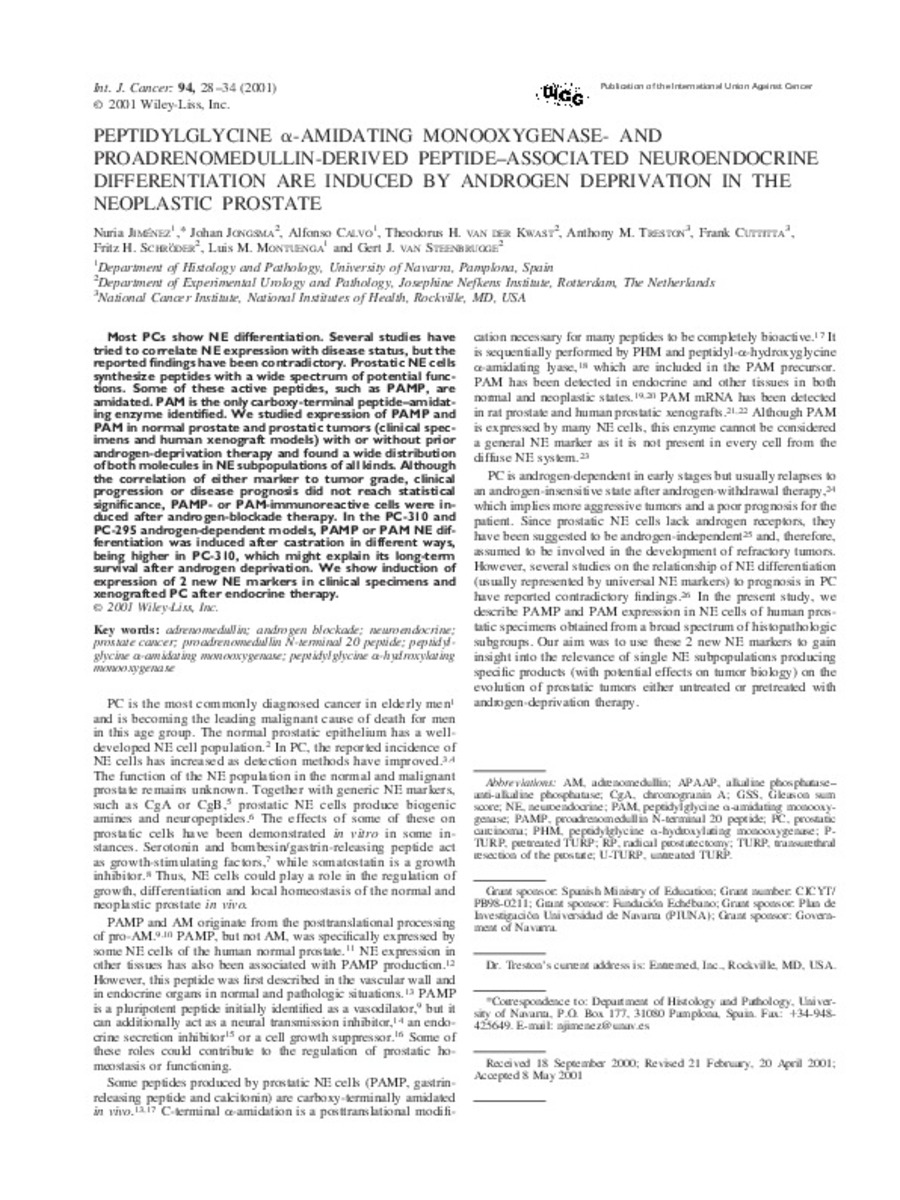Full metadata record
| DC Field | Value | Language |
|---|---|---|
| dc.creator | Jimenez, N. (Nuria) | - |
| dc.creator | Jongsma, J. (Johan) | - |
| dc.creator | Calvo-González, A. (Alfonso) | - |
| dc.creator | Kwast, T.H. (Theodorus H. ) van der | - |
| dc.creator | Treston, A.M. (Anthony M.) | - |
| dc.creator | Cuttitta, F. (Frank) | - |
| dc.creator | Schröder, F.H. (Fritz H.) | - |
| dc.creator | Montuenga-Badia, L.M. (Luis M.) | - |
| dc.creator | Steenbrugge, G.J. (Gert J.) van | - |
| dc.date.accessioned | 2011-12-12T09:38:06Z | - |
| dc.date.available | 2011-12-12T09:38:06Z | - |
| dc.date.issued | 2001 | - |
| dc.identifier.citation | Jimenez N, Jongsma J, Calvo A, van der Kwast TH, Treston AM, Cuttitta F, et al. Peptidylglycine alpha-amidating monooxygenase- and proadrenomedullin-derived peptide-associated neuroendocrine differentiation are induced by androgen deprivation in the neoplastic prostate. Int J Cancer 2001 Oct 1;94(1):28-34. | es_ES |
| dc.identifier.issn | 1097-0215 | - |
| dc.identifier.uri | https://hdl.handle.net/10171/20190 | - |
| dc.description.abstract | Most PCs show NE differentiation. Several studies have tried to correlate NE expression with disease status, but the reported findings have been contradictory. Prostatic NE cells synthesize peptides with a wide spectrum of potential functions. Some of these active peptides, such as PAMP, are amidated. PAM is the only carboxy-terminal peptide-amidating enzyme identified. We studied expression of PAMP and PAM in normal prostate and prostatic tumors (clinical specimens and human xenograft models) with or without prior androgen-deprivation therapy and found a wide distribution of both molecules in NE subpopulations of all kinds. Although the correlation of either marker to tumor grade, clinical progression or disease prognosis did not reach statistical significance, PAMP- or PAM-immunoreactive cells were induced after androgen-blockade therapy. In the PC-310 and PC-295 androgen-dependent models, PAMP or PAM NE differentiation was induced after castration in different ways, being higher in PC-310, which might explain its long-term survival after androgen deprivation. We show induction of expression of 2 new NE markers in clinical specimens and xenografted PC after endocrine therapy. | es_ES |
| dc.language.iso | eng | es_ES |
| dc.publisher | Wiley Blackwell | es_ES |
| dc.rights | info:eu-repo/semantics/openAccess | es_ES |
| dc.subject | Adrenomedullin | es_ES |
| dc.subject | Androgen blockade | es_ES |
| dc.subject | Neuroendocrine | es_ES |
| dc.subject | Prostate cancer | es_ES |
| dc.subject | Proadrenomedullin N-terminal 20 peptide | es_ES |
| dc.subject | Peptidylglycine a-amidating monooxygenase | es_ES |
| dc.subject | Peptidylglycine a-hydroxylating monooxygenase | es_ES |
| dc.title | Peptidylglycine alpha-amidating monooxygenase- and proadrenomedullin-derived peptide-associated neuroendocrine differentiation are induced by androgen deprivation in the neoplastic prostate | es_ES |
| dc.type | info:eu-repo/semantics/article | es_ES |
| dc.relation.publisherversion | http://onlinelibrary.wiley.com/doi/10.1002/ijc.1436/abstract | es_ES |
| dc.type.driver | info:eu-repo/semantics/article | es_ES |
Files in This Item:
Statistics and impact
Items in Dadun are protected by copyright, with all rights reserved, unless otherwise indicated.






